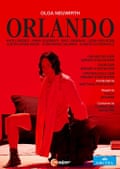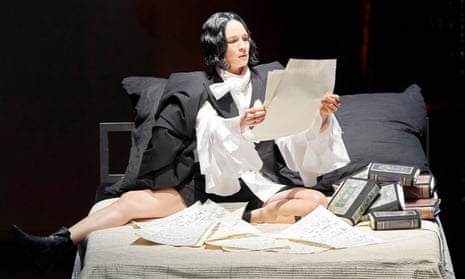As the first opera by a woman commissioned and presented by the Vienna State Opera, Olga Neuwirth’s Orlando, “a fictional musical biography in 19 scenes”, was headline news even before its premiere in 2019. Neuwirth and her librettist Catherine Filloux’s adaptation of Virginia Woolf’s story of an Elizabethan aristocrat who travels through four centuries, switching genders en route, extends the chronology of the novel from 1928, the year of its publication, through to the present day, taking in the Holocaust and the second world war, the social upheavals of the 1960s and the consumerism and greed of the 80s, right up to the rightwing populism of Trump.

That’s an awful lot of history to cram into a single stage work, and even though Orlando lasts three hours, and there’s a spoken commentary to provide a narrative thread, it leaves little room for real musical or psychological characterisation. Neuwirth’s score, fusing orchestral, electronic and sampled sounds, is often bewitching despite her rather unengaging vocal lines, while the use of musical quotations, from Elizabethan polyphony to Lady Gaga, is certainly entertaining. But the wit of Woolf’s original is nowhere to be found, and dramatically the opera gets thinner as it goes on. The final scenes, in which Neuwirth and Filloux introduce the character of Orlando’s non-binary child, played by the cabaret performer Justin Vivian Bond, seem more like noisy sloganising than convincing music theatre, and the music itself feels far less striking, despite the appearance of an on stage band.
The Vienna production, though, clearly didn’t stint on anything. Some of the sense of grandeur may be lost on a small screen, but the use of video, with texts projected on to the set, as well as the sumptuous costumes by Comme des Garçons, is certainly lavish. The director is Polly Graham, who took over the production only a couple of months before the premiere, by which time presumably the visuals had been finalised; she certainly marshals the spectacle efficiently, but could do little about the lack of depth in the characters, who often seem more caricature than flesh and blood.
As Orlando, the mezzo Kate Lindsey is outstanding in what is a hugely demanding role; the narrator, Anna Clementi (a late replacement, apparently, for Fiona Shaw) is less convincing, while Constance Hauman provides a telling cameo as the Queen. Matthias Pintscher is the conductor, efficiently coordinating everything; the combined effort is tremendous, the final effect rather less than might have been hoped.
This week’s other pick
John Eliot Gardiner’s touring versions of the three surviving Monteverdi operas were the highlights of the composer’s 450th-anniversary year in 2017, and recordings of those concert stagings are now being released by Opus Arte. L’Orfeo and Il Ritorno d’Ulisse in Patria have appeared so far, both taken from the performances in La Fenice, Venice; they capture very well the uncomplicated power of these modern-dress concert stagings, directed by Gardiner and Elsa Rooke, with a troupe of singers who take on roles in each of the operas. It’s the dramatic power of Monteverdi’s music that comes through most strongly, exactly as it should.

Comments (…)
Sign in or create your Guardian account to join the discussion